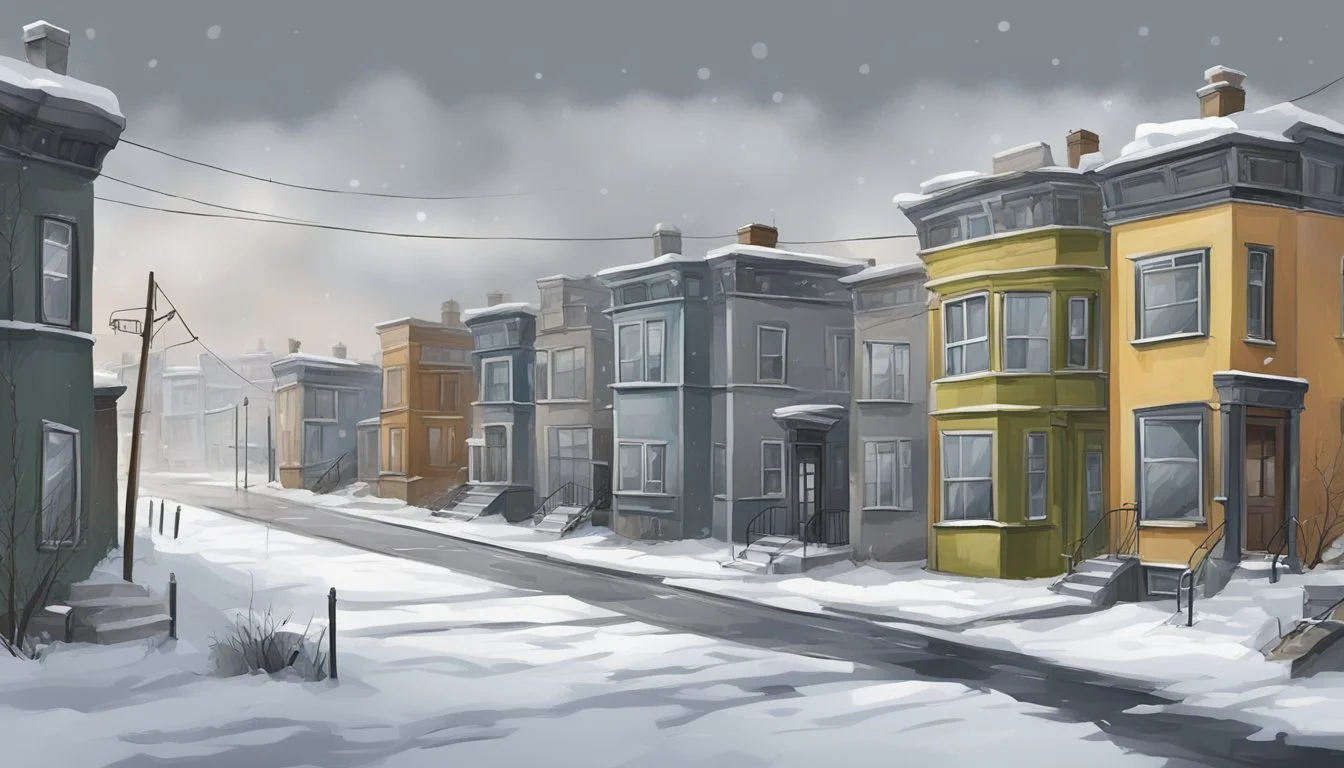Stolen Camera Exposes Atlanta's Underworld: Drug Dealer's Shocking Self-Documentary
"Snow on Tha Bluff" offers a raw, unflinching look at life in one of Atlanta's most notorious neighborhoods. This 2011 documentary-style film follows Curtis Snow, a real-life robbery boy and crack dealer, as he navigates the harsh realities of street life. Using a stolen camera, Snow captures the gritty daily existence in The Bluff, an area known for its high crime rates and pervasive drug culture.
The film blurs the line between reality and fiction, presenting a hybrid that's part documentary and part dramatized recreation. Curtis Snow's authentic experiences form the backbone of the narrative, providing viewers with an unvarnished glimpse into a world rarely seen by outsiders. His candid portrayal of criminal activities, drug deals, and survival tactics in a dangerous environment lends the film a sense of immediacy and authenticity.
"Snow on Tha Bluff" gained attention for its unique approach to storytelling and its unflinching depiction of urban struggles. The film's low-budget, guerrilla-style filmmaking adds to its raw aesthetic, enhancing the sense of realism that permeates every frame. It serves as both a stark social commentary and a compelling character study of Curtis Snow and the community he represents.
Background and Production
Snow on tha Bluff emerged as a gritty, documentary-style film that blurred the lines between reality and fiction. It offered an unflinching look into the dangerous world of drug dealing and crime in Atlanta's notorious Bluff neighborhood.
Origin and Concept
Snow on tha Bluff originated from a chance encounter between director Damon Russell and Curtis Snow, a real-life drug dealer from Atlanta. Russell was intrigued by Snow's raw stories of life in The Bluff, a neighborhood known for its high crime rates and drug activity.
The film's concept revolved around capturing Snow's daily life with an unfiltered lens. It aimed to portray the harsh realities of street life without glamorization or judgment.
Russell and Snow decided to create a hybrid documentary-fiction film. This unique approach allowed them to incorporate real events from Snow's life while also constructing narrative elements for dramatic effect.
Damon Russell
Damon Russell, an independent filmmaker, took on the challenging role of directing Snow on tha Bluff. His background in both documentary and narrative filmmaking made him well-suited for this unconventional project.
Russell's approach emphasized authenticity over polished production values. He opted for a raw, handheld camera style to immerse viewers in the chaotic world of The Bluff.
The director worked closely with Curtis Snow to build trust and gain access to typically closed-off areas of Atlanta's drug trade. Russell's ability to navigate this dangerous environment was crucial to the film's creation.
Filming in Atlanta
Production of Snow on tha Bluff took place entirely in Atlanta, focusing on The Bluff neighborhood. This area, known for its high crime rates and drug activity, provided a stark backdrop for the film.
The crew used guerrilla-style filming techniques to capture authentic moments. They often shot in real locations with minimal setup, adding to the documentary feel of the project.
Filming in such a volatile environment presented numerous challenges. The production team had to remain vigilant and adapt quickly to changing situations to ensure their safety.
Authenticity and Style
Snow on tha Bluff's distinctive style blended documentary realism with narrative elements. The film used a found footage approach, with much of the action supposedly captured on a stolen camcorder.
This technique allowed for intimate, unscripted moments that gave viewers an unfiltered look into Curtis Snow's world. The handheld camera work and natural lighting added to the gritty, authentic feel.
The film's dialogue was largely improvised, drawing from real conversations and experiences in The Bluff. This approach lent credibility to the performances and situations depicted on screen.
Plot Summary
Snow on Tha Bluff follows Curtis Snow, a drug dealer and robber in Atlanta's notorious Bluff neighborhood. The film blends documentary and dramatized elements to depict Snow's dangerous criminal activities and daily life.
Main Narrative
Curtis Snow steals a camera from college students during a drug deal. He then uses this camera to document his life in The Bluff. The film showcases Snow's involvement in drug trafficking, robberies, and violent confrontations.
Viewers witness raw scenes of drug use, illegal transactions, and tense encounters with rival criminals. Snow's relationships with family members and associates are also explored, revealing the complex social dynamics within his community.
The narrative unfolds in a gritty, unfiltered manner, offering an intimate look at life in one of Atlanta's most dangerous areas.
Major Turning Points
Several key events shape the film's progression:
The initial camera theft, which sets the documentary in motion
A violent altercation with rival drug dealers
A police raid on Snow's home
A revenge-driven mission against those who wronged Snow
These incidents escalate the tension and danger throughout the story. Snow's decisions in response to these events drive the narrative forward, often leading to further complications and risks.
The film's climax involves a high-stakes confrontation that forces Snow to reconsider his lifestyle and future prospects.
Characters
Curtis Snow takes center stage as the protagonist in "Snow on tha Bluff," with supporting characters playing crucial roles in depicting life in Atlanta's criminal underworld.
Curtis Snow - The Protagonist
Curtis Snow portrays a fictionalized version of himself in the film. He's a small-time drug dealer and robber from Atlanta's rough "Bluff" neighborhood. Snow steals a camera from college students during a drug deal, using it to document his daily life.
His character navigates the dangerous world of drug dealing and crime while struggling with fatherhood. Snow's raw and unfiltered portrayal gives viewers an authentic glimpse into the harsh realities of street life.
The film blurs the line between reality and fiction, as Snow draws from his real-life experiences to create a compelling on-screen presence.
Supporting Cast
The supporting cast in "Snow on tha Bluff" consists mainly of non-professional actors from Atlanta's street scene. These individuals lend authenticity to the film's gritty atmosphere.
Key supporting characters include Snow's friends and fellow criminals who assist in his illegal activities. The film also features rival drug dealers, creating tension and conflict throughout the narrative.
The college students who lose their camera to Snow play a brief but pivotal role in setting the documentary-style framework of the film. Their encounter with Snow kicks off the story and provides the means for Snow to record his experiences.
Reception and Impact
"Snow on tha Bluff" generated significant attention and sparked debates about authenticity, representation, and ethical filmmaking. The documentary's raw portrayal of life in Atlanta's roughest neighborhoods left a lasting impression on viewers and critics alike.
Critical Response
Film critics praised "Snow on tha Bluff" for its gritty realism and unfiltered look at street life. Many compared it favorably to other urban documentaries, noting its unflinching approach. Some reviewers questioned the ethics of filming illegal activities and the potential exploitation of subjects.
The film's blurring of fiction and reality sparked discussions about documentary filmmaking techniques. Critics debated whether the movie's raw style enhanced its authenticity or raised concerns about manipulation.
Cultural Influence
"Snow on tha Bluff" became a cult classic in certain circles, particularly among hip-hop fans and independent film enthusiasts. The documentary's depiction of Atlanta's drug trade and street culture influenced music videos, fashion, and slang.
Several rappers referenced the film in their lyrics, further cementing its place in pop culture. The movie's impact extended beyond entertainment, sparking conversations about poverty, crime, and urban decay in American cities.
Public Perception
Audiences were divided in their reactions to "Snow on tha Bluff". Some viewers praised its unflinching portrayal of life in impoverished neighborhoods, while others criticized it for glorifying criminal behavior.
The film's protagonist, Curtis Snow, became a controversial figure. Some saw him as a sympathetic anti-hero, while others viewed him as a dangerous criminal. Debates arose about the ethics of giving a platform to individuals involved in illegal activities.
Law enforcement agencies expressed concerns about the film's potential to glamorize drug dealing and violence. Community leaders in Atlanta had mixed reactions, with some praising the movie's honesty and others worrying about its impact on the city's image.
Themes and Analysis
"Snow on tha Bluff" explores complex themes of crime, reality, and social issues in Atlanta's notorious Bluff neighborhood. The documentary's raw portrayal offers a nuanced look at urban life and the struggles faced by its inhabitants.
Representation of Crime
The film provides an unflinching depiction of criminal activities in The Bluff. Curtis Snow, the protagonist, engages in drug dealing and robbery, offering viewers a firsthand look at the illegal economy sustaining many in the area. The camera captures tense drug transactions and violent confrontations, illustrating the ever-present danger.
Cocaine plays a central role, highlighting its destructive impact on individuals and the community. The documentary shows how the drug trade shapes daily life, relationships, and power dynamics in the neighborhood.
Reality vs Fiction
"Snow on tha Bluff" blurs the line between documentary and dramatization. While presented as real footage, questions arise about the authenticity of certain scenes. This ambiguity adds a layer of complexity to the viewing experience.
The film's gritty, handheld camera work lends an air of authenticity, making it difficult to distinguish staged events from genuine moments. This approach challenges viewers to consider the nature of truth in documentary filmmaking.
Social Commentary
The documentary serves as a powerful social commentary on systemic issues plaguing low-income urban areas. It sheds light on the lack of opportunities, education, and resources available to residents of The Bluff.
The film portrays how crime becomes a means of survival in an environment with limited legitimate options. It raises questions about the cycle of poverty and violence, and the societal factors that perpetuate these conditions.
Through Curtis Snow's story, the documentary humanizes individuals often portrayed as one-dimensional criminals in mainstream media. It reveals the complex motivations and circumstances that lead to a life of crime.
Legal and Ethical Issues
"Snow on tha Bluff" raises complex legal and ethical questions about crime documentation and drug culture portrayal. The film's raw depiction of illegal activities and its blurred line between reality and fiction have sparked debates.
Legal Controversies
The documentary's unfiltered portrayal of cocaine dealing and violent crime in Atlanta's "Bluff" neighborhood prompted legal scrutiny. Curtis Snow, the film's central figure, faced potential legal consequences for his on-camera activities.
Law enforcement officials questioned whether the footage constituted evidence of actual crimes. This led to discussions about the limits of artistic expression versus criminal documentation.
The filmmakers' decision to include scenes of apparent drug use and sales also raised concerns about complicity in illegal activities. Critics argued that by not intervening, the crew may have tacitly endorsed criminal behavior.
Ethical debates emerged around the exploitation of marginalized communities for entertainment. Some viewers felt the film glorified drug culture, while others saw it as an important exposé of systemic issues.
Behind the Scenes
"Snow on tha Bluff" presented unique challenges in its production and drew inspiration from real-life experiences. The filmmakers navigated ethical and safety concerns while capturing authentic moments in Atlanta's notorious neighborhood.
Production Challenges
Filming in The Bluff posed significant risks for the crew. Director Damon Russell and his team had to maintain a low profile to avoid attracting unwanted attention. They used handheld cameras and minimal equipment to blend in with the surroundings.
The documentary's raw authenticity required careful negotiation with local residents. Many were initially skeptical of the filmmakers' intentions. Russell had to build trust and establish relationships within the community to gain access and cooperation.
Editing the footage presented another hurdle. The team had to balance preserving the gritty realism with creating a coherent narrative. They sifted through hours of material to select scenes that best represented Curtis Snow's daily life and struggles.
Real-Life Inspirations
Curtis Snow's experiences as a drug dealer in The Bluff formed the backbone of the documentary. His willingness to share his story on camera provided a rare glimpse into the harsh realities of life in one of Atlanta's most dangerous neighborhoods.
The film drew inspiration from actual events and people in Snow's life. His interactions with friends, family, and fellow dealers were largely unscripted, lending an air of authenticity to the scenes.
The Bluff itself served as a character in the documentary. Its dilapidated buildings, open-air drug markets, and constant police presence created a vivid backdrop for Snow's story. The neighborhood's reputation for crime and poverty added depth to the film's exploration of systemic issues.
Conclusion
Snow on Tha Bluff offers a raw, unfiltered glimpse into the harsh realities of life in Atlanta's infamous Bluff neighborhood. Curtis Snow's candid portrayal provides viewers with an intimate look at the challenges faced by those living in marginalized communities.
The film's unique blend of documentary and narrative elements pushes the boundaries of traditional storytelling. It raises important questions about authenticity and representation in media.
Snow on Tha Bluff has left a lasting cultural impact, sparking discussions about poverty, drug use, and systemic issues in urban America. Its unflinching approach has both captivated and polarized audiences.
The documentary's legacy continues to influence filmmakers and social commentators. It serves as a powerful testament to the complexities of life in underserved neighborhoods like The Bluff.
Curtis Snow's journey, as depicted in the film, sheds light on the limited options available to many in similar circumstances. It challenges viewers to confront uncomfortable truths about inequality and social mobility in contemporary society.






